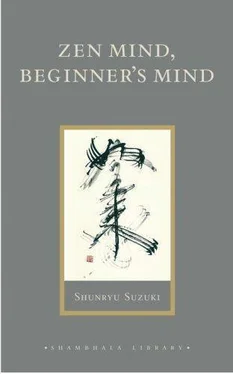We say our practice should be without gaining ideas, without any expectations, even of enlightenment. This does not mean, however, just to sit without any purpose. This practice free from gaining ideas is based on the Prajna Paramita Sutra. However, if you are not careful the sutra itself will give you a gaining idea. It says, “Form is emptiness and emptiness is form.” But if you attach to that statement, you are liable to be involved in dualistic ideas: here is you, form, and here is emptiness, which you are trying to realize through your form. So “form is emptiness, and emptiness is form” is still dual- istic. But fortunately, our teaching goes on to say, “Form is form and emptiness is emptiness.” Here there is no dualism.
When you find it difficult to stop your mind while you are sitting and when you are still trying to stop your mind, this is the stage of “form is emptiness and emptiness is form.” But while you are practicing in this dualistic way, more and more you will have oneness with your goal. And when your practice becomes effortless, you can stop your mind. This is the stage of “form is form and emptiness is emptiness.”
To stop your mind does not mean to stop the activities of mind. It means your mind pervades your whole body. Your mind follows your breathing. With your full mind you form the mudra in your hands. With your whole mind you sit with painful legs without being disturbed by them. This is to sit without any gaining idea. At first you feel some restriction in your posture, but when you are not disturbed by the restriction, you have found the meaning of “emptiness is emptiness and form is form.” So to find your own way under some restriction is the way of practice.
Practice does not mean that whatever you do, even lying down, is zazen. When the restrictions you have do not limit you, this is what we mean by practice. When you say, “Whatever I do is Buddha nature, so it doesn’t matter what I do, and there is no need to practice zazen,” that is already a dualistic understanding of our everyday life. If it really does not matter, there is no need for you even to say so. As long as you are concerned about what you do, that is dualistic. If you are not concerned about what you do, you will not say so. When you sit, you will sit. When you eat, you will eat. That is all. If you say, “It doesn’t matter,” it means that you are making some excuse to do something in your own way with your small mind. It means you are attached to some particular thing or way. That is not what we mean when we say, “Just to sit is enough,” or “Whatever you do is zazen.” Of course whatever we do is zazen, but if so, there is no need to say it.
When you sit, you should just sit without being disturbed by your painful legs or sleepiness. That is zazen. But at first it is very difficult to accept things as they are. You will be annoyed by the feeling you have in your practice. When you can do everything, whether it is good or bad, without disturbance or without being annoyed by the feeling, that is actually what we mean by “form is form and emptiness is emptiness.”
When you suffer from an illness like cancer, and you realize you cannot live more than two or three years, then seeking something upon which to rely, you may start practice. One person may rely on the help of God. Someone else may start the practice of zazen. His practice will be concentrated on obtaining emptiness of mind. That means he is trying to be free from the suffering of duality. This is the practice of “form is emptiness and emptiness is form.” Because of the truth of emptiness, he wants to have the actual realization of it in his life. If he practices in this way, believing and making an effort, it will help him, of course, but it is not perfect practice.
Knowing that your life is short, to enjoy it day after day, moment after moment, is the life of “form is form, and emptiness emptiness.” When Buddha comes, you will welcome him; when the devil comes, you will welcome him. The famous Chinese Zen master Ummon, said, “Sun-faced Buddha and moon-faced Buddha.” When he was ill, someone asked him, “How are you?” And he answered, “Sun-faced Buddha and moon-faced Buddha.” That is the life of “form is form and emptiness is emptiness.” There is no problem. One year of life is good. One hundred years of life are good. If you continue our practice, you will attain this stage.
At first you will have various problems, and it is necessary for you to make some effort to continue our practice. For the beginner, practice without effort is not true practice. For the beginner, the practice needs great effort. Especially for young people, it is necessary to try very hard to achieve something. You must stretch out your arms and legs as wide as they will go. Form is form. You must be true to your own way until at last you actually come to the point where you see it is necessary to forget all about yourself. Until you come to this point, it is completely mistaken to think that whatever you do is Zen or that it does not matter whether you practice or not. But if you make your best effort just to continue your practice with your whole mind and body, without gaining ideas, then whatever you do will be true practice. Just to continue should be your purpose. When you do something, just to do it should be your purpose. Form is form and you are you, and true emptiness will be realized in your practice.
After zazen we bow to the floor nine times. By bowing we are giving up ourselves. To give up ourselves means to give up our dualistic ideas. So there is no difference between zazen practice and bowing. Usually to bow means to pay our respects to something which is more worthy of respect than ourselves. But when you bow to Buddha you should have no idea of Buddha, you just become one with Buddha, you are already Buddha himself. When you become one with Buddha, one with everything that exists, you find the true meaning of being. When you forget all your dualistic ideas, everything becomes your teacher, and everything can be the object of worship.
When everything exists within your big mind, all dualistic relationships drop away. There is no distinction between heaven and earth, man and woman, teacher and disciple. Sometimes a man bows to a woman; sometimes a woman bows to a man. Sometimes the disciple bows to the master; sometimes the master bows to the disciple. A master who cannot bow to his disciple cannot bow to Buddha. Sometimes the master and disciple bow together to Buddha. Sometimes we may bow to cats and dogs.
In your big mind, everything has the same value. Everything is Buddha himself. You see something or hear a sound, and there you have everything just as it is. In your practice you should accept everything as it is, giving to each thing the same respect given to a Buddha. Here there is Buddhahood. Then Buddha bows to Buddha, and you bow to yourself. This is the true bow.
If you do not have this firm conviction of big mind in your practice, your bow will be dualistic. When you are just yourself, you bow to yourself in its true sense, and you are one with everything. Only when you are you yourself can you bow to everything in its true sense. Bowing is a very serious practice. You should be prepared to bow even in your last moment; when you cannot do anything except bow, you should do it. This kind of conviction is necessary. Bow with this spirit and all the precepts, all the teachings are yours, and you will possess everything within your big mind.
Sen no Rikyu, the founder of the Japanese tea ceremony, committed hara-kiri (ritual suicide by disembowelment) in
I59I at the order of his lord, Hideyoshi. Just before Rikyu took his own life he said, “When I have this sword there is no Buddha and no Patriarchs.” He meant that when we have the sword of big mind, there is no dualistic world. The only thing which exists is this spirit. This kind of imperturbable spirit was always present in Rikyu’s tea ceremony. He never did anything in just a dualistic way; he was ready to die in each moment. In ceremony after ceremony he died, and he renewed himself. This is the spirit of the tea ceremony. This is how we bow.
Читать дальше


![Джон Харгрейв - Mind Hacking [How to Change Your Mind for Good in 21 Days]](/books/404192/dzhon-hargrejv-mind-hacking-how-to-change-your-min-thumb.webp)








